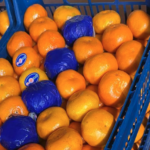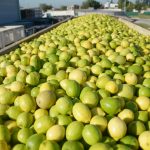Opinion: What does the future hold for Colombian produce in the USA?

By Andes Fruits Colombia GM Matt Aaron
 There is no doubt that in international agriculture, and especially in South America, patience is a virtue.
There is no doubt that in international agriculture, and especially in South America, patience is a virtue.
The potential of Colombia is widely known but it is still one of the least agriculturally productive countries in Latin America.
With the Produce Marketing Association's (PMA) Fresh Summit coming next week, here are three insights on the future of Colombian produce to the United States:
Goldenberries need access from all of Colombia sans system approach to really grow
While goldenberries are approaching a US$100 million in annual sales in Europe, the United States is still a very small market. To be fair, the U.S. market is about 15 years younger, as direct access only opened up in 2015.
But Europe has far fewer restrictions. There are 32 departments (states) in Colombia, and all are allowed to send goldenberries to Europe. Only two are eligible to send to the U.S.
Also, there is a very strict nine-month protocol from ICA (Colombian Agricultural Institute, the USDA equivalent) in order to enable a farm to export to the U.S.
In summary, it is slow and geographically limited. If the restrictions above are lifted, it will mean that the USDA feels comfortable that the high altitude grown fruit is not a risk for the Mediterranean fruit fly.
Avocado approval to the United States – overhyped?
I would like to be proved wrong here. There has been a lot of news about Colombian avocados to the United States, but I wonder how much of an impact they will make in the Mexican dominated market.
In a country with high logistics costs, competing with Mexico and to a lesser extent Peru will be quite tough.
There has been quite a bit of buzz and PR around Colombian avocados, but this also requires action to raise awareness of the country of origin in the U.S.
Peru has a commission for avocados based in Washington D.C. and has done quite a bit of marketing and advertising for the Peruvian avocado.
This is essential for any country of origin entering the U.S. but can Colombia do it as well as their other Latin American peers?
And remember, getting approval by the USDA for a new fruit to enter means A LOT of teamwork between Colombia and the U.S.
Hopefully the relationship is stronger now and that helps open up the door for fruits like yellow pitahaya, the passion fruit family, and papaya, which could be quite attractive for the U.S. market.
Blockchain will change everything
It would take hours to explain the technology, but let’s just say blockchain technology makes trust a commodity and gets rid of a lot of unnecessary middlemen.
While it is going to take time, this is the future and possibly could be as impactful as the invention of the internet.
I will share a list of a few improvements this could make for Colombian growers/exporters and U.S. buyers and consumers
- Automate a lot of manual paperwork
- Improve transparency and traceability
- Prevent fraud
- Faster clearance times
- More efficient payment processes
- Reduced food waste
- Fairer contracts in between exporters and buyers
Unfortunately, the countries that most need blockchain technology will be the most resistant because corruption thrives on opacity and centralized control.
Excited to see what the coming year brings and look forward to seeing you at the PMA’s (will be at Booth #6029!)
















































